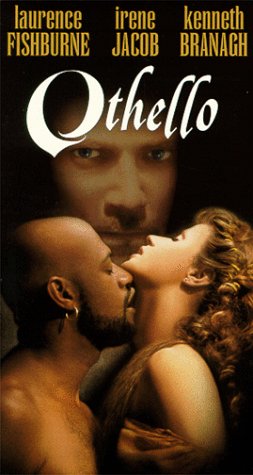Dr. Michael Delahoyde
Washington State University
OTHELLO
ACT IV
SCENE i
Iago continues preying on Othello, pretending to give Desdemona the
benefit of the doubt. He's got Othello begging for each word about what
Iago knows from Cassio. Othello has a mini-breakdown, babbling, "Pish!
Noses, ears, and lips. Is't possible? Confess? Handkerchief? O devil!"
(IV.i.42-43). He falls into a trance and Iago rejoices in his evil
effects. Cassio enters and Iago tells him that Othello is in an epileptic
fit. Iago revives Othello, but telling him to "be a man" (IV.i.65); after all,
the world is full of cuckolds. He will talk with Cassio in a way that
Othello can secretly witness.
Iago talks with Cassio sufficiently out of earshot about Bianca so that
by the laughter and bawdry Othello can think they're discussing Cassio's
affair with Desdemona. Othello then catches a glimpse of the handkerchief
when Bianca pitches a fit at Cassio over the token.
At Iago's instigation, Cassio runs after Bianca, giving Iago time to rub
in what apparently was being discussed, and Othello is homicidal. He
praises Desdemona, but with a nostalgic brokenheartedness. Iago
recommends strangling Desdemona in the bed she contaminated
(IV.i.207-208).
Lodovico arrives from Venice with another summons for Othello. He is
sorry to learn from Desdemona that there's been the falling out between
Othello and Cassio. He soon witnesses Othello violent with Desdemona and
generally losing it: "You are welcome, sir, to Cyprus.--Goats and
monkeys!" (IV.i.263). The apparent non-sequitur unleashes the imagery of
bestiality and carnality. Iago implies to Lodovico that Othello is a big
disappointment, to which Lodovico states, "I am sorry that I am deceiv'd
in him" (282).
SCENE ii
Othello grills Emilia about Desdemona and Cassio. Emilia insists to
Othello that Desdemona is faithful, but Othello is past trusting women.
He rails at a baffled Desdemona, ultimately calling her a whore. When he
leaves, Emilia brings Iago to Desdemona, but he feigns ignorance. Emilia
senses that "some eternal villain, / Some busy and insinuating rogue, /
Some cogging, cozening slave" devised the slander (IV.ii.130-133). She
tends to serve as a safety valve for the audience's feelings in this
scene (Goddard, II 97). Iago can only suggest feebly that "The business of
the state does him offense, / And he does chide with you"
(IV.ii.166-167).
The women go to supper. Roderigo enters, accusing Iago of pilching the
jewels intended as gifts for Desdemona. Iago admits it's been slow going,
but he flatters Roderigo by playing up his newfound gumption here. If
Desdemona isn't his two nights from now, Roderigo can kill Iago
treacherously. Iago tells him that Othello has been summoned by Venice,
but he and Desdemona would have to stay in Cyprus if there were "some
accident" such as the "removing of Cassio" (IV.ii.226-227), er, um, like
"making him uncapable of Othello's place: knocking out his brains"
(IV.ii.229-230). So Iago convinces Roderigo to ambush Cassio tonight in
the midnight hour. Iago will back him up, just in case. They exit, with
Iago promising to explain fully the various reasons they need to kill
Cassio.
|
SCENE iii
Othello and Lodovico go out for a walk while Emilia helps Desdemona
prepare for bed. Desdemona seems to have some premonition about what's
coming, and she reminisces about her mother's maid singing the melancholy
song "Willow." Is there a meditative punning on "Will O" (Ogburn and Ogburn
519)?
Desdemona asks Emilia if "there be women do abuse their
husbands / In such gross kind" (IV.iii.62-63). She asks if Emilia would
be unfaithful "for all the world" (IV.iii.64), and Emilia thinks that might be a
good deal. Emilia then offers the following:
I do think it is their husbands' faults
If wives do fall. Say they slack their duties,
And pour our treasures into foreign laps;
Or else break out in peevish jealousies,
Throwing restraint upon us; or say they strike us,
Or scant our former having in despite:
Why, we have galls; and though we have some grace,
Yet have we some revenge. Let husbands know
Their wives have sense like them; they see, and smell,
And have their palates both for sweet and sour,
As husbands have. What is it that they do
When they change us for others? Is it sport?
I think it is. And doth affection breed it?
I think it doth. Is't frailty that thus errs?
It is so too. And have not we affections,
Desires for sport, and frailty, as men have?
Then let them use us well; else let them know,
The ills we do, their ills instruct us so.
(IV.iii.86-103)
This speech appears only in the Folio text and therefore seems a late
addition or afterthought. Is it relevant to the play?
|

|
Act V
Shakespeare Index
